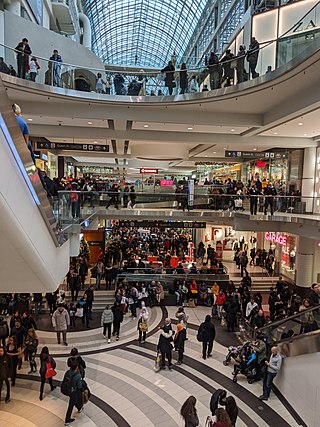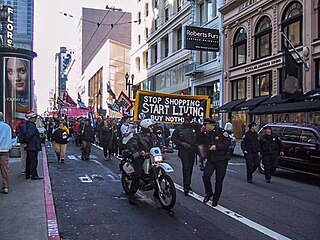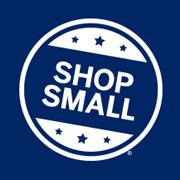
Bubble tea is a tea-based drink that originated in Taiwan in the early 1980s. Taiwanese immigrants brought it to the United States in the 1990s, initially in California through regions including Los Angeles County, but the drink has also spread to other countries where there is a large East Asian diaspora population.

Boxing Day is a holiday celebrated after Christmas Day, occurring on the second day of Christmastide. Boxing Day was once a day to donate gifts to those in need, but it has evolved to become a part of Christmas festivities, with many people choosing to shop for deals on Boxing Day. It originated in the United Kingdom and is celebrated in several Commonwealth nations. The attached bank holiday or public holiday may take place on 27 or 28 December if necessary to ensure it falls on a weekday. Boxing Day is also concurrent with the Christian festival Saint Stephen's Day.

IKEA, is a multinational conglomerate founded in Sweden that designs and sells ready-to-assemble furniture, kitchen appliances, decoration, home accessories, and various other goods and home services. IKEA is owned and operated by a series of not-for-profit and for-profit corporations collectively known and managed as Inter IKEA Group and Ingka Group. The IKEA brand itself is owned and managed by Inter IKEA Systems B.V., a company incorporated in the Netherlands.

Prohibition is the act or practice of forbidding something by law; more particularly the term refers to the banning of the manufacture, storage, transportation, sale, possession, and consumption of alcoholic beverages. The word is also used to refer to a period of time during which such bans are enforced.

Buy Nothing Day is a day of protest against consumerism. In North America, the United Kingdom, Finland and Sweden, Buy Nothing Day is held the day after U.S. Thanksgiving, concurrent with Black Friday; elsewhere, it is held the following day, which is usually the last Saturday in November.

Black Friday is the Friday after Thanksgiving in the United States. It traditionally marks the start of the Christmas shopping season and is the busiest shopping day of the year in the United States. Many stores offer highly promoted sales at heavily discounted prices and often open early, sometimes as early as midnight or even on Thanksgiving. Some stores' sales continue to Monday or for a week.

In the United States, public holidays are set by federal, state, and local governments and are often observed by closing government offices or giving government employees paid time off. The federal government does not require private businesses to close or offer paid time off, as is the case for most state and local governments, so employers determine which holidays to observe.
Ethical consumerism is a type of consumer activism based on the concept of dollar voting. People practice it by buying ethically made products that support small-scale manufacturers or local artisans and protect animals and the environment, while boycotting products that exploit children as workers, are tested on animals, or damage the environment.

QVC is an American free-to-air television network and a flagship shopping channel specializing in televised home shopping, owned by Qurate Retail Group. Founded in 1986 by Joseph Segel in West Chester, Pennsylvania, United States, QVC broadcasts to more than 350 million households in seven countries, including channels in the UK, Germany, Japan, and Italy, along with a joint venture in China with China National Radio called CNR Mall.
The weekdays and weekend are the complementary parts of the week devoted to labour and rest, respectively. The legal weekdays, or workweek, is the part of the seven-day week devoted to working. In most of the world, the workweek is from Monday to Friday and the weekend is Saturday and Sunday. A weekday or workday is any day of the working week. Other institutions often follow this pattern, such as places of education. The constituted weekend has varying definitions, based on determined calendar days, designated period of time, and/or regional definition of the working week. Sometimes the term "weekend" is expanded to include the time after work hours on the last workday of the week. Weekdays and workdays can be further detailed in terms of working time, the period of time that an individual spends at paid occupational labor.
Cyber Monday is a marketing term for e-commerce transactions on the Monday after Thanksgiving in the United States. It was created by retailers to encourage people to shop online. The term was coined by Ellen Davis of the National Retail Federation and Scott Silverman, and made its debut on November 28, 2005, in a Shop.org press release entitled "Cyber Monday Quickly Becoming One of the Biggest Online Shopping Days of the Year." Cyber Monday takes place the Monday after Thanksgiving; the date falls between November 26 and December 2, depending on the year.

The Christmas season or the festive season, also known as the holiday season or the holidays, is an annual period generally spanning from November or December to early January. Incorporating Christmas Day and New Year's Day, the various celebrations during this time create a peak season for the retail sector extending to the end of the period. Christmas window displays and Christmas tree lighting ceremonies are customary traditions in various locales.

Meatless Monday and Meat Free Monday are international campaigns that encourage people to not eat meat on Mondays to improve their health and the health of the planet.

Sustainable fashion is a term describing efforts within the fashion industry to reduce its environmental impacts, protect workers producing garments and uphold animal welfare. Sustainability in fashion encompasses a wide range of factors, including cutting CO2 emissions, addressing overproduction, reducing pollution and waste, supporting biodiversity and ensuring that garment workers are paid a fair wage and have safe working conditions.

Singles' Day or Double 11 is an unofficial Chinese holiday for people who are not in a relationship. The date, 11 November (11/11), was chosen because the numeral 1 resembles a bare stick, Chinese Internet slang for an unmarried man. The four '1's also refer to the demographic group of single people. Ironically, the holiday has become a popular date on which to celebrate relationships: more than 4,000 couples got married in Beijing on this date in 2011, far greater than the daily average of 700 marriages.

Alcohol laws are laws relating to manufacture, use, as being under the influence of and sale of alcohol or alcoholic beverages. Common alcoholic beverages include beer, wine, (hard) cider, and distilled spirits. Definition of alcoholic beverage varies internationally, e.g., the United States defines an alcoholic beverage as "any beverage in liquid form which contains not less than one-half of one percent of alcohol by volume". Alcohol laws can restrict those who can produce alcohol, those who can buy it, when one can buy it, labelling and advertising, the types of alcoholic beverage that can be sold, where one can consume it, what activities are prohibited while intoxicated, and where one can buy it. In some cases, laws have even prohibited the use and sale of alcohol entirely.
Cyber Black Friday is a marketing term for the online version of Black Friday, the day after Thanksgiving Day in the United States. The term made its debut in a 2009 press release entitled "Black Friday Goes Online for Cyber Black Friday". According to TechCrunch, there was $9 billion in online sales on Cyber Black Friday, which is up 21.6% from 2019. With this, the average cart-size for a shopper was $95.60, and Shopify noted that there was an average of $6.3 million spent per minute across their more than one million merchant platform. A lot of this spending was directed towards technological devices, primarily smart phones. Of the $9 billion is sales, $3.6 billion (40%) was for smart phones. However, Cyber Black Friday is still inferior to its sister, Cyber Monday. Cyber Monday is primarily known to offer more discounted items, and is projected to reach sales between $11.2 billion and $13 billion in 2020. On a more promising note, Gian Fulgoni of comScore said, "Black Friday, better known as a shopping bonanza in brick-and-mortar retail stores, is increasingly becoming one of the landmark days in the online holiday shopping world." Some Cyber Black Friday sales are short-lived, last through the weekend, into Cyber Monday, and beyond.

Small Business Saturday is a marketing initiative created and promoted by American Express to encourage holiday shopping on the Saturday after Thanksgiving in the United States, during one of the busiest shopping periods of the year. This Saturday is always the last one in November, so it falls between November 24 and November 30.

A circular economy is a model of resource production and consumption in any economy that involves sharing, leasing, reusing, repairing, refurbishing, and recycling existing materials and products for as long as possible. The concept aims to tackle global challenges such as climate change, biodiversity loss, waste, and pollution by emphasizing the design-based implementation of the three base principles of the model. The main three principles required for the transformation to a circular economy are: designing out waste and pollution, keeping products and materials in use, and regenerating natural systems. CE is defined in contradistinction to the traditional linear economy.

The economics of Christmas are significant because Christmas is typically a high-volume selling season for goods suppliers around the world. Sales increase dramatically as people purchase gifts, decorations, and supplies to celebrate. In the U.S., the "Christmas shopping season" starts as early as October. In Canada, merchants begin advertising campaigns just before Halloween, and step up their marketing following Remembrance Day on 11 November. In the UK and Ireland, the Christmas shopping season starts from mid-November, around the time when high street Christmas lights are turned on. In the United States, it has been calculated that about one fifth of retail sales to one quarter of all personal spending takes place during the Christmas/holiday shopping season. Figures from the U.S. Census Bureau reveal that expenditure in department stores nationwide rose from $20.8 billion in November 2004 to $31.9 billion in December 2004, an increase of 54 percent. In other sectors, the pre-Christmas increase in spending was even greater, due to a November through December buying surge of 100% in bookstores and 170% in jewelry stores. In the same year employment in American retail stores rose from 1.6 million to 1.8 million in the two months leading up to Christmas. This means that while consumers might spend more during this season, they also are given increased employment opportunities as sales rise to meet the increased demand.
















